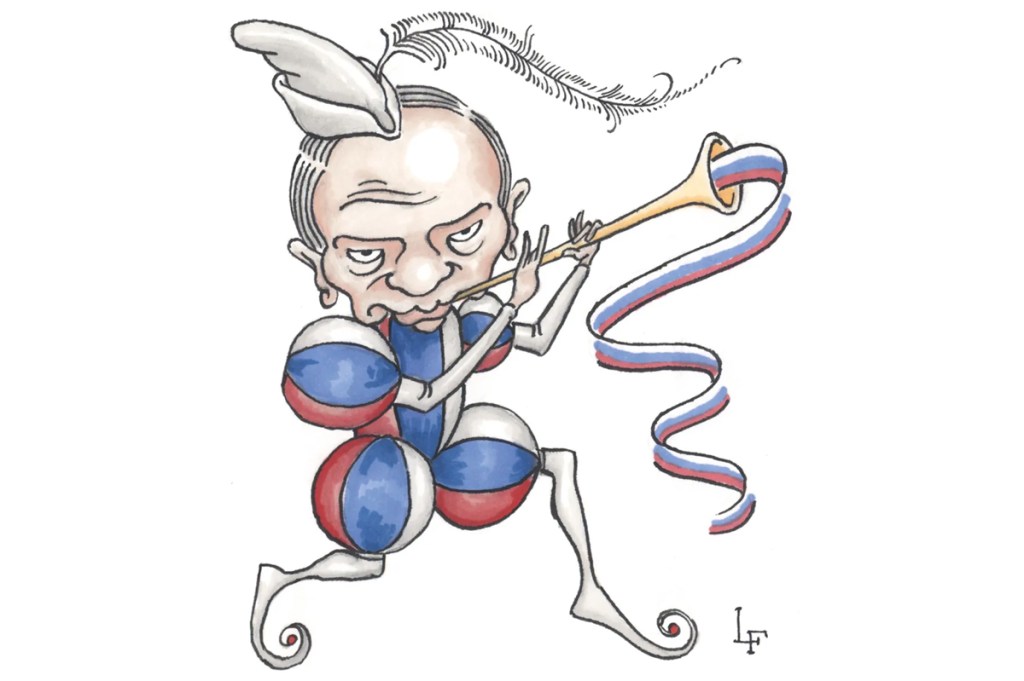Tofurious Maximus Crane was sitting in a barber’s chair in Moscow when he received the greatest news of his life. It was August 19, the day Vladimir Putin signed a decree allowing foreigners to immigrate to Russia. Now, the forty-six-year-old native of Virginia Beach, Virginia, could finally achieve his life’s dream of remaining in Russia forever. “For me, the decree is the best thing that ever happened in my life besides, you know, family and children,” says Crane, a charismatic bear of an American who sports a long Old Testament beard and perfectly coiffed hipster hair. “I got the notification about the decree, and I jumped up out of the chair and was crying. I was very excited.”
Thanks to Putin’s decree, citizens from a list of “unfriendly” western countries are officially welcome to immigrate to Russia as long as they share Russia’s “spiritual and moral values.” For thirty-nine-year-old Jozef Schutzman, originally from Dallas, Texas, Russia is a place where he and his growing family have found religious freedom and escape from the “liberal ideologies which have permeated through America… the US became untenable for me.” A traditional Latin-rite Catholic, Schutzman moved to Russia last year with his Australian wife in order to “preserve the innocence” of his seven children.
Maria Butina is leading the effort to set disenchanted westerners up with new lives in Russia. Butina is a member of the State Duma from the Kremlin-backing United Russia Party. She is better known in the US for her 2018 conviction for acting as an unregistered foreign agent in the course of her work with conservative groups in the US, including the National Rifle Association. The Senate Intelligence Committee later concluded that Butina had also attempted to persuade the Trump campaign to establish a secret communications channel with Russia.
“This role was really thrust upon me after I was put in jail by the US government,” says Butina, who was released in October 2019 after serving fifteen months in a federal penitentiary. “They made such a show that it made a big name for me, especially among gun lobbyists, who are the kind of people who are interested in alternative points of view.” In the wake of the pandemic, Americans interested in moving to Russia began to write to Butina. Her entire Duma office staff are now devoted to helping western immigrants with the practicalities of their moves.
By Butina’s account, her team gets around fifteen serious inquiries every day, and around 3,500 westerners have already settled in Russia since 2021. Of these, 31 percent are from Germany, 25 percent from Latvia and the rest, in descending order, from Italy, France, the US, Canada and Australia. Butina’s office is not yet aware of any Brits who have taken up the new scheme, though several who have been living in Moscow since before the war attend Butina’s monthly receptions for the new immigrants in Moscow’s House of Nationalities. Butina doesn’t give the newcomers any subsidies, but the governor of Nizhny Novgorod has set up a scheme to attract up to 7,000 immigrants, headed by a German businessman, which offers cheap land and housing. Dobrograd, a private community development in Vladimir, two and a half hours outside Moscow, is advertising heavily to encourage westerners to move to apartments that start at €50,000.
In October, Butina organized a demonstration outside the US embassy in Moscow to protest against political prisoners in the US. Crane was there, as well as a handful of other conservative expatriates, including the British expat Dean Standley, who sported an orange T-shirt emblazoned with “Russian Lives Matter.” It concealed a tattoo of Putin that he has on his back. Standley is a forty-five-year-old financial services consultant from Solihull in England’s West Midlands. In Moscow, where he has lived since 2012, Standley says he has found “economic opportunity… the most beautiful girls in the world” and — perhaps most importantly — “freedom.” Russia is “a million times more free [than the UK] in terms of freedom in every aspect and context, even freedom of speech.”
According to Butina, many of the latest crop of émigrés cited compulsory Covid vaccinations among their principal motivations for moving. Religious conservatives were the next biggest group, including traditional Catholics, Protestants and Russian Orthodox converts. “These people want to educate their children in freedom,” says Butina. “They want to be able to protect them from LBGT values without some representative of the state juvenile social services coming to their door and taking their children away.” The smallest group is people with political motives, such as Americans who have been involved in the January 6 attempted insurrection and others who claim political persecution by the FBI and Interpol.
Crane, for instance, insists that he entered the Capitol during January 6 as an observer and blogger, yet he nonetheless attracted the attention of the FBI. He came to Russia last year and made a documentary for the state-owned RT channel in Russian-occupied Donbas, billing himself as an “independent American journalist” (despite sporting a prominent “Z,” the symbol of Russia’s “special military operation,” on his baseball cap). Crane continues to make documentary films for RT, as well as running several popular social media accounts celebrating life in Russia. For Crane, Russia is a “beacon of hope” and a “lifeboat” for conservatives from the US and Europe. “A lot of people in America are tired of the LGBT agenda being pushed on them by Hollywood and media organizations and the government,” says Crane, a former medical technician who quit after refusing to administer Covid vaccines. “Look at [western] economies right now, look at their people. Look at the amount of homeless people on the streets, the amount of drug addicts. They’re rejecting moral values. We see a massive decline in western societies.”
Others have more practical explanations for why they love Russia. Standley moved to Moscow more than a decade ago, but since the beginning of the war his business has been, by his own account, to find “legal holes in the sanctions which allowed money to remitted 100 percent legally… in every law in the world, every regulation, there’s always holes and regulation, there’s always holes and cracks in financial laws.” Maltese financial regulators, however, begged to differ, and for a year and a half Standley was wanted by Interpol. Though the case has been closed (Standley’s name is currently not among Interpol’s outstanding Red Notices), he says he’d never move back to the UK. Russia is “such a diverse country. It’s a very free country in terms of what you want to say. Taxation is very low here.”
For Schutzman, the final straw came when “the FBI declared that traditional Catholics like us were domestic terrorists” (a reference to a 2023 memo, later withdrawn, by the FBI field office in Richmond, Virginia, detailing possible links between specific “radical traditionalist” Catholic groups and white nationalists). He visited Moscow in February last year and moved with his family that fall. Despite speaking little Russian, Schutzman found employment as a senior executive working on IT transformation. “We have gone up in the world since moving to Russia,” he says. “Angels carried us here.”
He loves his life in Moscow — a recent RT documentary showed the Schutzmans wheeling their young children, all in matching outfits, across Red Square in a special toddler-carrying cart. “People are traditional and normal here,” he says. “Men act like men, women act like women.” In his home in rural Kansas, by Schutzman’s account, he couldn’t take his kids to the store without them seeing trans people. In Russia, “people don’t walk up to my wife and mock her for having so many children.”
The exodus of up to a million Russian top executives and IT specialists after the beginning of the war has left a huge need for qualified professionals. There’s a lot of work to be done and not enough people to do it, which explains why Putin is keen to encourage westerners to move to Russia.
Russia has a mixed history when it comes to welcoming immigrants. Catherine the Great sent out recruiters to persuade whole communities of Saxons, French Protestants and British adventurers to bring their skills to New Russia. Several hundred American communists — including the black labor activist Lovett Fort-Whiteman — moved there in the 1920s, but all ended up in the gulag. Lee Harvey Oswald demanded political asylum in the USSR in 1959 and lived in Minsk for two years, marrying a Russian woman before changing his mind and moving back to the US. And in the 1990s up to 100,000 westerners, from entrepreneurs to hucksters to journalists, bankers and executives, piled into Moscow in search of money and good times. In the wake of sanctions and Kremlin expropriations of western-owned businesses, just a handful remain.
Nonetheless, Putin evidently hopes to make Russia into a sanctuary for conservatives from all over the world, a new world based on the unchanging values of Christianity and traditional family values. “I used to believe that America was a shining city on a hill,” says Butina. “But that American dream is broken, it’s gone… Now, for many westerners, Russia is the hope. And we are ready to welcome them.”
This article was originally published in The Spectator’s December 2024 World edition.


























Leave a Reply